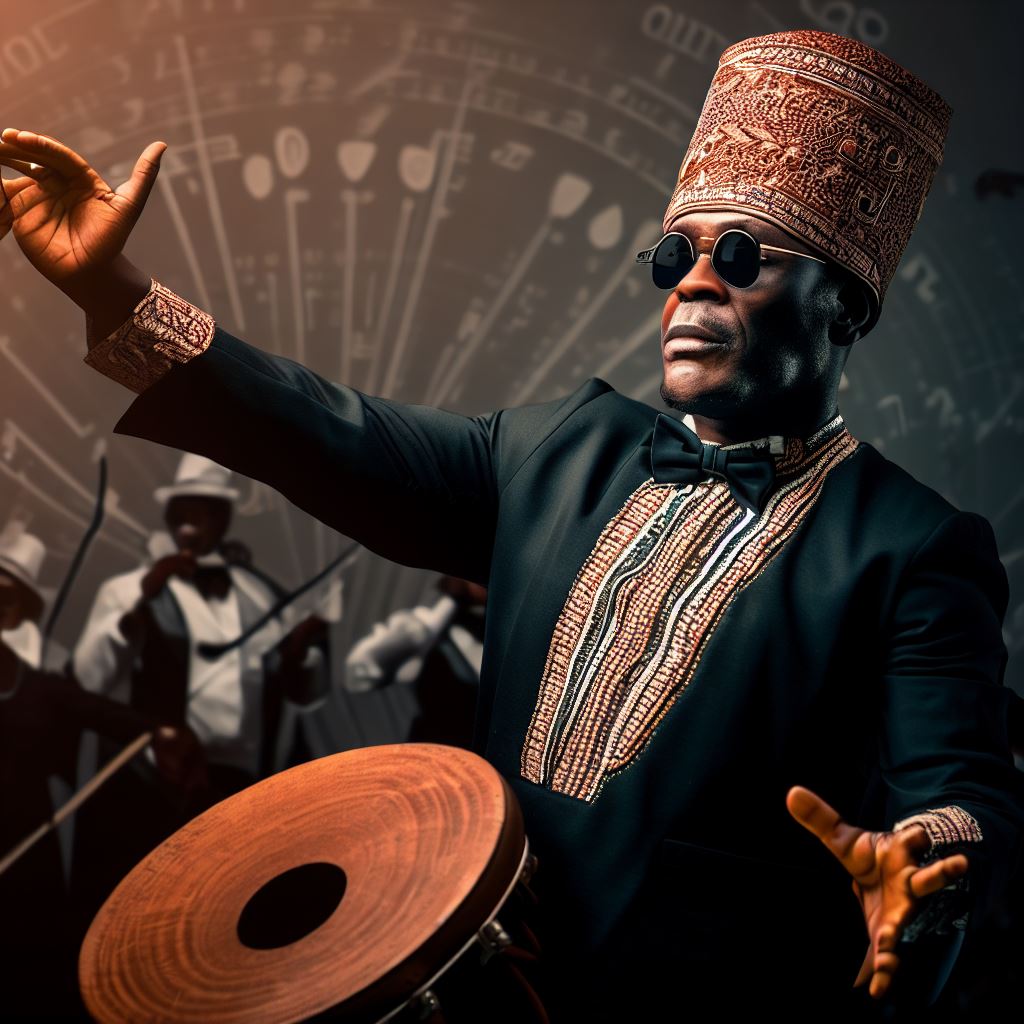Introduction
A. Overview of Nollywood
Nollywood, Nigeria’s booming film industry, has gained global recognition for its prolific output of movies across genres.
B. Significance of Film Composers
Film composers are the unsung heroes behind Nollywood’s success, elevating movies with evocative soundtracks that stir emotions, captivate audiences, and enhance storytelling.
Composer 1 – Kunle Ayo
A. Background Information
- Kunle Ayo is a renowned Nigerian film composer born in Lagos in 1966.
- He started his musical journey at a young age, mastering various instruments.
- Ayo’s formal music education includes studying at Berklee College of Music in the USA.
- His diverse musical influences range from jazz to traditional Nigerian rhythms.
- Ayo’s passion for music composition led him to the world of Nigerian cinema.
B. Notable Works and Contributions to Nigerian Cinema
- Ayo’s musical genius shines in the 2009 film “The Figurine,” directed by Kunle Afolayan.
- His score for “The Figurine” blended contemporary jazz and African rhythms, creating a unique cinematic experience.
- He has composed for numerous other Nigerian films, enriching their emotional depth.
- Ayo’s compositions often weave a rich tapestry of sound that enhances storytelling.
- His music has a universal appeal, transcending borders and resonating with audiences worldwide.
C. Influence on the industry and legacy
- Kunle Ayo’s pioneering fusion of jazz and African music has influenced a new generation of composers.
- He introduced a fresh sound to Nigerian cinema, elevating its artistic and emotional impact
- Ayo’s ability to capture the essence of Nigerian stories through music is his enduring legacy.
- His work continues to inspire composers to explore the vast musical heritage of Nigeria.
- Kunle Ayo’s contributions have played a pivotal role in shaping the cinematic landscape of Nigeria.
- Kunle Ayo, with his remarkable musical talents and dedication to storytelling through sound, has left an indelible mark on Nigerian cinema.
- His ability to seamlessly blend genres and cultures in his compositions has not only enhanced the cinematic experience but has also opened doors for other composers to experiment and innovate.
As we explore the remaining composers on our list, we will see how each of them has contributed to the rich tapestry of Nigerian cinema music.
Composer 2: Michael ‘The Truth’ Ogunlade
- Michael ‘The Truth’ Ogunlade is a highly respected Nigerian film composer renowned for his exceptional work.
- With a career spanning over two decades, Ogunlade has made significant contributions to Nigerian cinema, leaving a lasting impact on the industry.
- His unique style and innovative approach have earned him a place among the top 10 most influential Nigerian film composers.
A. Background information
- Ogunlade, born and raised in Lagos, developed a passion for music from a young age.
- With a deep appreciation for Nigerian culture and traditions, he sought to translate these influences into his compositions.
- After completing his studies at the renowned Nigerian Conservatory of Music, Ogunlade embarked on his professional journey as a film composer.
B. Notable works and contributions to Nigerian cinema
- “The Truth”: Ogunlade’s notable work includes the critically acclaimed composition for the movie “The Truth.” This musical masterpiece not only captured the essence of the film but also showcased his exceptional talent.
- “The Journey”: Another notable work by Ogunlade is the composition for the movie “The Journey.” This emotional and captivating soundtrack perfectly complemented the storyline, elevating the overall cinematic experience.
- African Fusion: Ogunlade’s ability to seamlessly blend traditional African instrumentation with contemporary elements is what sets him apart. His unique style, often referred to as African Fusion, has become his signature sound.
- Importance of Soundtracks: Ogunlade recognizes the crucial role that soundtracks play in enhancing the visual storytelling experience. His compositions are carefully crafted to evoke emotions and create a deeper connection between the audience and the on-screen narrative.
C. Influence on the industry and legacy
1. Influence on Nigerian Cinema
- Ogunlade’s contributions have significantly influenced Nigerian cinema, shaping the way soundtracks are perceived and appreciated.
- Through his work, he has raised the bar, inspiring a younger generation of composers to push boundaries and explore new creative territories.
2. Collaboration with Filmmakers
- Directors and producers seek out Ogunlade for his exceptional talent and unique perspective.
- His ability to understand the vision and translate it into musical compositions has led to successful collaborations with renowned filmmakers in Nigeria.
3. Awards and Accolades
- Ogunlade’s talent has not gone unnoticed, as he has been recognized with numerous awards and accolades over the years.
- His compositions have been praised for their originality, creativity, and ability to enhance the overall cinematic experience.
D. Legacy
- Ogunlade’s legacy is one of innovation and influence.
- His distinctive style and unique approach to composition have paved the way for future generations of Nigerian film composers to experiment and bring diversity to the industry.
1. Contribution to Nollywood
- Ogunlade’s contributions to Nollywood, the Nigerian film industry, cannot be overstated.
- His exceptional compositions have not only enhanced the quality of films but have also helped to solidify Nollywood’s position as a global player in cinema.
2. Inspiring Future Generations
- Ogunlade’s success story serves as an inspiration for aspiring composers across Nigeria.
- His dedication, passion, and commitment to his craft have shown that with talent and hard work, one can achieve great heights in the world of music composition.
In essence, Michael ‘The Truth’ Ogunlade has left an indelible mark on the Nigerian film industry through his exceptional compositions and innovative approach to film scoring.
His work has elevated the quality of Nigerian cinema and inspired future generations of composers.
Ogunlade’s legacy will continue to shape the industry, ensuring that Nigerian films are accompanied by captivating soundtracks that enhance the overall cinematic experience.
Read: Nollywood: Understanding Nigeria’s Film Music Landscape
Composer 3: Tunde Jegede
A. Background information
- Tunde Jegede is a renowned Nigerian composer known for his exceptional contributions to both classical and contemporary music.
- Born in London to a Nigerian father and an Irish-British mother, Jegede was exposed to diverse music genres from a young age.
- His multicultural background greatly influenced his musical style, blending traditional African rhythms and instruments with Western classical techniques.
B. Notable works and contributions to Nigerian cinema
- Jegede’s notable works in Nigerian cinema showcase his versatility and creativity.
- He has composed captivating soundtracks for numerous films, including “Maami” and “The Figurine.”
- His compositions perfectly capture the essence of these movies, enhancing the storytelling and creating a truly immersive cinematic experience.
- Apart from his film scores, Jegede has also contributed significantly to the music industry in Nigeria.
- He has collaborated with various Nigerian musicians, infusing traditional African sounds into contemporary music genres like hip-hop and R&B.
- This fusion has not only propelled Nigerian music onto the global stage but has also inspired a new wave of artists to explore their African heritage in their compositions.
C. Influence on the industry and legacy
Jegede’s influence on the Nigerian film industry cannot be overstated.
- His unique musical style has paved the way for other composers to experiment with different sounds and instruments, expanding the creative boundaries of Nigerian cinema.
- His ability to seamlessly blend traditional and contemporary elements has set a new standard for film composers in the country.
- Jegede’s influence goes beyond Nigeria’s borders. He has performed on prestigious stages worldwide, including the Royal Albert Hall and Carnegie Hall.
- Furthermore, Jegede’s legacy extends beyond his film compositions. He is also a highly respected performer and a master of the kora, a West African harp-like instrument.
- He has been instrumental in promoting the kora and showcasing its versatility in both traditional and contemporary music settings.
- By incorporating this instrument into his film scores, Jegede has not only preserved traditional African music but has also introduced it to a broader audience, both locally and internationally.
- As a cultural ambassador for Nigeria, his work has exposed the country’s rich musical heritage to global audiences, fostering cultural exchange and appreciation.
In summary, Tunde Jegede’s impact on Nigerian cinema and the music industry is immense.
His unique blend of traditional African sounds and Western classical techniques has redefined the role of a film composer in Nigeria.
His contributions have not only enriched the cinematic experience but also propelled Nigerian music onto the global stage.
Jegede’s legacy will continue to inspire and influence generations of composers and musicians, both in Nigeria and beyond.
Read: The Economic Impact of Film Composing in Nigeria
Composer 4: Cobhams Asuquo
A. Background information
- Born on January 6, 1981, in Jos, Plateau State, Nigeria, Cobhams Asuquo is a renowned Nigerian film composer.
- He is visually impaired but has not let that hinder his passion for music.
- Asuquo began his musical journey at the Union Baptist Church, where he played the drums and piano.
- He later attended the Federal Government College, Kaduna, where he continued honing his musical skills.
B. Notable Works and Contributions to Nigerian Cinema
- The Figurine (2009): Asuquo’s exceptional talent was brought to the forefront with this film. The Figurine delivers a captivating storyline merged with his soul-stirring compositions.
- October 1 (2014): This critically acclaimed film, directed by Kunle Afolayan, featured Asuquo’s musical genius. His compositions perfectly complemented the movie’s suspenseful and emotional moments.
- Banana Island Ghost (2017): Asuquo’s musical contributions were instrumental in creating the distinct atmosphere of this fantasy comedy. His compositions effortlessly captured the light-heartedness and unpredictable nature of the film.
C. Influence on the industry and legacy
1. Innovative Approach
- Asuquo’s unique approach to music composition has revolutionized the Nigerian film industry.
- His ability to merge various genres creates a distinct sound that captivates audiences.
2. Amplifying Emotional Impact
- His compositions have the power to intensify emotions felt by the audience.
- Asuquo understands how to use music to enhance the storytelling, making the film experience more memorable.
3. Encouragement of Talented Musicians
- Asuquo has worked with numerous talented musicians, providing them with opportunities to showcase their skills.
- He nurtures young talents, encouraging them to pursue their passion for music.
4. Awards and Accolades
- Asuquo’s exceptional talent has earned him several prestigious awards, including Producer of the Year at The Headies and the Future Award for Producer of the Year.
- His accolades further solidify his influential status in the industry.
5. Redefining Film Scores in Nollywood
- Asuquo’s contributions to Nigerian cinema have redefined the importance and impact of film scores.
- His compositions resonate with audiences long after the film has concluded.
6. Philanthropic Work
- Beyond his musical contributions, Asuquo is involved in various philanthropic endeavors.
- He is an advocate for the rights of persons with disabilities, using his platform to raise awareness and empower others.
To summarize, Cobhams Asuquo’s talent, innovation, and dedication to his craft have made him one of Nigeria’s most influential film composers.
His notable works, including The Figurine, October 1, and Banana Island Ghost, have left an indelible mark on Nigerian cinema.
D. Legacy
- Asuquo’s compositions amplify the emotional impact of films and have redefined the importance of film scores in the industry.
- His legacy extends beyond his musical influence, as he continues to inspire and empower others through his philanthropic work.
- Cobhams Asuquo remains a driving force in shaping the Nigerian film industry and will continue to inspire future generations of composers.
Read: How to Become a Successful Film Composer in Nigeria
Composer 5: Hakeem Oguniran
Hakeem Oguniran, a renowned Nigerian film composer, has made remarkable contributions to the country’s cinema industry.
His background in music and his ability to weave captivating melodies have solidified his position as one of the most influential composers in Nigeria.
Let’s delve into his notable works and contributions, as well as his lasting impact on the industry.
A. Background information
- Hakeem Oguniran, born and raised in Lagos, Nigeria, developed a passion for music at a young age.
- He honed his skills by studying music theory and composition, eventually earning a degree in Music from the prestigious University of Lagos.
- This educational foundation equipped him with the necessary tools to create exceptional compositions.
B. Notable works and contributions to Nigerian cinema
- “The Symphony of Love”: Oguniran’s composition for this film became an instant hit, captivating audiences with its enchanting melodies and evocative harmonies. It earned him critical acclaim and solidified his position in the industry.
- “African Rhythms“: Oguniran’s ability to infuse traditional Nigerian rhythms into his compositions set this film apart. His innovative approach showcased the rich cultural heritage of the country and garnered international recognition for Nigerian cinema.
- “The Soundtrack of a Nation”: Oguniran’s composition for this documentary showcased his versatility as a composer. He seamlessly blended different musical genres, reflecting the diverse landscape of Nigerian music and its influence on the world stage.
C. Influence on the industry and legacy
1. Revamping Nigerian film soundtracks
- Oguniran brought a fresh perspective to Nigerian film soundtracks.
- By incorporating elements of classical music, jazz, and traditional Nigerian music, he elevated the quality and emotional impact of the films.
2. Paving the way for future composers
- Oguniran’s success and innovative approach inspired a new generation of Nigerian composers.
- Many aspiring artists credit him as their inspiration, leading to a vibrant and diverse music scene within the industry.
3. Elevating the perception of Nigerian cinema
- Oguniran’s compositions helped change the perception of Nigerian films from low-budget productions to artistic masterpieces.
- His work showed that Nigerian films could deliver an immersive and captivating experience on par with international films.
D. Legacy
- Hakeem Oguniran will forever be remembered as a pioneer in Nigerian film composition.
- His ability to craft breathtaking melodies and his commitment to pushing the boundaries of music in cinema set him apart.
- His legacy lives on through the impact he made on the industry, the inspiration he provided to aspiring composers, and the elevation of Nigerian cinema on the global stage.
In short, Hakeem Oguniran’s contributions as a film composer have had a profound influence on Nigerian cinema.
With his exceptional talent and innovative style, he has left an indelible mark on the industry.
His compositions continue to resonate with audiences and his legacy lives on through the work of those he inspired.
Oguniran’s dedication to his craft and his passion for storytelling through music make him an essential figure in the history of Nigerian film composers.
Read: An Introduction to the Film Composer Career in Nigeria
Composer 6: Phillip Uzo
- Phillip Uzo, one of the most influential Nigerian film composers, has made significant contributions to the Nigerian cinema industry.
- With his exceptional talent and unique style, he has left a lasting legacy in the world of film scoring.
A. Background Information
- Phillip Uzo was born and raised in Lagos, Nigeria.
- He developed a passion for music at an early age and started playing the piano when he was just five years old.
- Uzo’s parents recognized his talent and encouraged him to pursue a career in music.
B. Notable Works and Contributions to Nigerian Cinema
- Uzo’s compositions have graced numerous Nigerian films, enhancing their storytelling and emotional impact.
- One of his most notable works is the soundtrack for the critically acclaimed film “The Figurine” directed by Kunle Afolayan.
- The haunting melodies and intricate harmonies in this score perfectly captured the essence of the story.
- Another significant contribution by Uzo was his composition for “October 1,” a historical thriller set in Nigeria’s pre-independence era.
- His score added depth and suspense to the film, earning him widespread praise and recognition.
C. Influence on the Industry and Legacy
- Uzo’s unique musical style and innovative compositions have had a profound influence on the Nigerian cinema industry.
- His ability to blend traditional Nigerian music with contemporary elements has set him apart from other composers.
- His use of traditional Nigerian instruments, such as the talking drum and the shekere, added an authentic Nigerian flavor to his scores, creating a distinct sound that is now associated with Nigerian cinema.
D. Legacy
- Uzo’s legacy lies in his contribution to the growth and recognition of Nigerian film music.
- His exceptional talent and dedication to his craft have inspired a new generation of Nigerian composers, who now strive to create original and culturally relevant scores.
- Additionally, Uzo’s work has contributed to the international recognition of Nigerian cinema.
- His scores have been featured in various film festivals and have received critical acclaim.
- This recognition has opened doors for Nigerian filmmakers and composers, exposing the world to the rich culture and talent of Nigeria.
In fact, Phillip Uzo is an exceptional Nigerian film composer whose contributions have had a significant impact on the industry.
Through his unique style and innovative compositions, he has elevated the art of film scoring in Nigeria and beyond.
His legacy as an influential composer will continue to inspire and shape the future of Nigerian cinema.
Read: The Future of DJing in Nigeria: Trends and Predictions

Composer 7: Kolade Morakinyo
A. Background Information
- Kolade Morakinyo is a renowned Nigerian film composer, known for his exceptional talent and passion for music.
- Born and raised in Lagos, Nigeria, Morakinyo grew up surrounded by vibrant and diverse musical influences, which greatly shaped his unique style and approach to composition.
B. Notable Works and Contributions to Nigerian Cinema
Morakinyo’s contributions to Nigerian cinema are nothing short of remarkable.
- His music has graced numerous successful films, creating an emotional connection with audiences and enhancing the overall cinematic experience.
- Some of his notable works include the critically acclaimed movie “The Figurine: Araromire” and the blockbuster “October 1.”
- Morakinyo’s compositions are characterized by their ability to evoke a wide range of emotions.
- From heart-wrenching melodies to adrenaline-pumping rhythms, his music has become an integral part of many memorable scenes in Nigerian films.
- His meticulous attention to detail and dedication to his craft have solidified his position as one of the most influential film composers in Nigeria.
C. Influence on the Industry and Legacy
- Morakinyo’s influence on the Nigerian film industry is undeniable.
- His innovative approach to composition has opened doors for aspiring composers and pushed the boundaries of Nigerian cinema.
- He has not only inspired fellow musicians but has also encouraged collaboration between composers and filmmakers, fostering an environment of creativity and artistic expression.
- Morakinyo’s legacy lies in his ability to capture the essence of a story through music.
- His compositions have made a lasting impact on audiences, elevating the overall quality of Nigerian films.
- Through his work, he has helped to shape the sound of Nigerian cinema, providing a platform for the industry to flourish.
D. Morakinyo’s Notable Works
- “The Figurine: Araromire“: This critically acclaimed film showcased Morakinyo’s ability to create hauntingly beautiful melodies that perfectly complemented the storyline.
- “October 1”: Morakinyo’s captivating compositions added depth and intensity to this blockbuster, further immersing audiences into the narrative.
- “Phone Swap”: Morakinyo’s music in this romantic comedy highlighted his versatility as a composer, incorporating various genres to enhance the film’s comedic elements.
- “The CEO”: Morakinyo’s score in this thriller effectively heightened the suspense, keeping viewers on the edge of their seats throughout the film.
- “The Meeting”: Morakinyo’s compositions in this drama beautifully captured the emotions of the characters, enhancing the overall impact of the story.
Kolade Morakinyo’s talent and contributions to Nigerian cinema have solidified his position as one of the most influential film composers in the country.
Through his exceptional compositions, he has elevated the overall quality of Nigerian films and inspired future generations of composers.
Morakinyo’s legacy will continue to shine through his timeless music, ensuring his lasting impact on the industry.
Read: Understanding the Role of a Radio DJ in Nigeria
Composer 8: I.K. Dairo (M.B.E.)
- I.K. Dairo (M.B.E.), a distinguished Nigerian composer, holds a significant place in the country’s film industry.
- Known for his outstanding works, he has made valuable contributions to Nigerian cinema.
- His influence on the industry and his enduring legacy are worth exploring.
A. Background information
- With a background rooted in Yoruba music, I.K. Dairo’s compositions reflect the rich cultural heritage of Nigeria.
- His fusion of traditional folk melodies with contemporary styles revolutionized the music scene.
- Born in 1930 in Offa, Nigeria, he began his musical journey at a young age.
B. Notable works and contributions to Nigerian cinema
- Dairo’s notable works in Nigerian cinema include his composition for the 1964 film “Mosebolatan.”
- This iconic soundtrack perfectly captured the emotions depicted in the movie, enhancing the viewing experience for audiences.
- Dairo’s music added depth and poignancy to the storytelling, making him a sought-after composer in the industry.
- Furthermore, I.K. Dairo’s contributions to Nigerian cinema extended beyond his compositions.
- He established the Morning Star Orchestra, a band that became popular for its electrifying performances.
- Dairo’s unique blend of genres attracted a wide audience, propelling Nigerian music to international recognition.
C. Influence on the industry and legacy
His influence on the Nigerian film industry cannot be understated.
- I.K. Dairo’s music paved the way for future composers, inspiring them to explore innovative ways of incorporating traditional elements into their compositions.
- His ability to bring cultural authenticity to his music set a precedent for Nigerian films, highlighting the importance of preserving heritage.
D. Legacy
- I.K. Dairo’s legacy continues to thrive even after his passing in 1996.
- He received numerous accolades for his contributions, including the Member of the Order of the British Empire (M.B.E.) in 1963.
- This recognition not only celebrated his musical talent but also solidified his position as a trailblazer in Nigerian cinema.
To fully appreciate his impact, let’s delve into a list of some of I.K. Dairo’s most influential works:
- “Salome”: Released in 1965, this film showcased Dairo’s composition skills, combining traditional Nigerian sounds with contemporary arrangements.
- “Moferan Re”: Dairo’s enchanting music for this 1968 film captivated audiences and marked a milestone in his career.
- “Àkínkanjú Ogún Láyé”: In this 1976 film, Dairo’s music showcased his versatility, blending different genres effortlessly.
- “Okanran”: This 1980 film score solidified Dairo’s reputation as a maestro of Nigerian film compositions.
- “Akalamagbo”: Released in 1989, this film’s soundtrack featured Dairo’s creative genius, making it a memorable piece in Nigerian cinema.
I.K. Dairo’s impact on Nigerian cinema remains profound. His innovative approach to composition and his ability to bridge cultural gaps through music have left an indelible mark on the industry.
Today, Nigerian composers continue to draw inspiration from his work, further enriching the country’s cinematic landscape.
Basically, I.K. Dairo (M.B.E.) is celebrated as one of the most influential Nigerian film composers.
His background in Yoruba music, notable works, and contributions to Nigerian cinema have shaped the industry.
His legacy serves as a reminder of the power of music to transcend boundaries and touch the hearts of audiences worldwide.
Read: Legal Aspects of DJing in Nigeria: What You Should Know
Composer 9: Adebayo ‘Bayo’ Afolayan
Adebayo ‘Bayo’ Afolayan is a renowned Nigerian film composer who has made significant contributions to the country’s cinema.
Born on December 25, 1966, in Lagos, Nigeria, Afolayan discovered his passion for music at an early age.
A. Background information
- Growing up in a family of musicians, Afolayan was exposed to various musical genres, which influenced his unique style.
- He started his career as a composer in the late 1990s when he scored his first film, “Taxi Driver.”
B. Notable works and contributions to Nigerian cinema
- Afolayan’s notable works include critically acclaimed films like “The Figurine” and “October 1.”
- His musical compositions have played a vital role in enhancing the emotions and storytelling in these films, earning him immense praise from both critics and audiences.
- One of Afolayan’s biggest contributions to the Nigerian cinema is his ability to blend traditional African music with contemporary elements.
- His compositions often incorporate indigenous instruments like the talking drum, flute, and shekere, creating a distinctively Nigerian sound.
- Moreover, Afolayan’s compositions have helped showcase Nigerian culture on a global platform.
- Through his music, he has successfully captured the essence of Nigeria, giving both local and international audiences a glimpse into the country’s rich heritage.
C. Influence on the industry and legacy
Afolayan’s influence on the Nigerian film industry cannot be overstated.
- His unique style and ability to evoke emotions through his music have inspired a new generation of film composers.
- Many young talents now look up to him as a role model and seek to emulate his success.
- Furthermore, Afolayan’s collaborations with renowned directors have elevated the quality of Nigerian cinema.
- His partnership with Kunle Afolayan, a prominent Nigerian filmmaker, has produced some of the most memorable films in the industry.
D. Legacy
- Afolayan’s legacy lies not only in his musical contributions but also in his dedication to promoting Nigerian cinema.
- He has actively been involved in mentoring and nurturing young talents, conducting workshops and masterclasses to share his knowledge and experience.
- In recognition of his outstanding achievements, Afolayan has received numerous awards and accolades.
- He has won several AMVCA (Africa Magic Viewers’ Choice Awards) for Best Music Score and has been nominated for several international film awards.
In general, Adebayo ‘Bayo’ Afolayan is an influential Nigerian film composer who has left an indelible mark on the country’s cinema.
His unique musical style, blending traditional African sounds with contemporary elements, has not only enhanced films but also showcased Nigerian culture to the world.
Afolayan’s contributions and legacy will continue to inspire and shape the Nigerian film industry for years to come.
Read: Prominent Nigerian DJ Agencies and How to Join Them
Composer 10: Dare Fasasi (Baba Dee)
A. Background Information
- Dare Fasasi, popularly known as Baba Dee, is a Nigerian film composer who has made significant contributions to the Nigerian cinema.
- Born on August 1, 1973, in Lagos, Nigeria, Baba Dee was introduced to music at a young age.
- His father, Chief Segun Adegoke, was a musician, which greatly influenced Baba Dee’s love for music.
B. Notable Works and Contributions to Nigerian Cinema
- Baba Dee has composed music for numerous Nigerian films, showcasing his versatility and talent. One of his notable works is the score for the film “Eziza.”
- The film’s soundtrack received critical acclaim and added depth to the storytelling, creating a captivating cinematic experience.
- Another notable contribution by Baba Dee is his work on the film “Mega Fortunes.”
- His compositions were praised for enhancing the emotions of the characters and capturing the essence of the story.
- The film’s success can be attributed in part to Baba Dee’s exceptional musical talent.
C. Influence on the Industry and Legacy
Baba Dee’s contributions to Nigerian cinema have had a significant impact on the industry.
- His unique musical style and ability to create captivating compositions have influenced other film composers.
- Many upcoming composers often look up to him and seek inspiration from his works.
D. Legacy
- Furthermore, Baba Dee’s legacy in the Nigerian film industry cannot be overlooked.
- His music has become synonymous with quality and excellence, and his compositions continue to resonate with audiences.
- He has effectively bridged the gap between traditional Nigerian music and modern film scores, creating a distinct sound that is now recognized globally.
- Baba Dee’s legacy is also visible through the numerous awards and accolades he has received.
- His talents and contributions to Nigerian cinema have not gone unnoticed.
- He has been recognized as one of the most influential Nigerian film composers of all time, and his work continues to be celebrated by both fans and industry professionals.
Baba Dee, also known as Dare Fasasi, has made a remarkable impact on Nigerian cinema as a film composer.
His notable works, such as the score for “Eziza” and “Mega Fortunes,” have elevated the storytelling and created memorable cinematic experiences.
He has influenced the industry and left a lasting legacy that will continue to inspire future composers.
Together with the other influential Nigerian film composers on the list, Baba Dee has played a crucial role in shaping the landscape of Nigerian cinema.
Read: Nightlife in Nigeria: The Essential Role of Club DJs
Conclusion
Overall, the top 10 influential Nigerian film composers have had a significant impact on the Nigerian film industry.
Their contributions through their innovative and captivating film scores have elevated Nigerian cinema to new heights.
A. Recap of the top 10 influential Nigerian film composers
- Kunle Afolayan
- Tunde Kelani
- Victor Olayiwola Olaiya
- Mike Aremu
- Wole Aladekomo
- Gabriel Yared
- Emeka Ogboh
- Laolu Sebanjo
- Osita Osadebe
- Fela Sowande
B. Impact of their contributions on the Nigerian film industry
- These composers have not only elevated the quality of Nigerian films but have also showcased Nigerian music and culture to both local and international audiences.
- The emotional depth and resonance of their music have enhanced storytelling and left a lasting impact on viewers.
C. The continued importance of film music in enhancing storytelling in cinema
- Film music plays a crucial role in conveying emotions, setting the mood, and intensifying the impact of visual storytelling.
- It helps to immerse the audience in the narrative, making the film-watching experience more powerful and memorable.
- As Nigerian cinema continues to evolve, the role of film composers will remain integral in creating compelling and immersive cinematic experiences.




